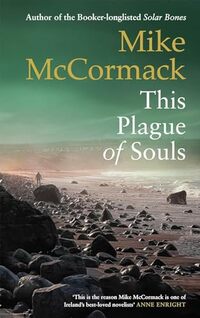This Plague of Souls by Mike McCormack
 Wednesday, December 27, 2023 at 5:12AM
Wednesday, December 27, 2023 at 5:12AM 
First published in Great Britain in 2023; published by Soho Press on January 2, 2024
John Nealon grew up with an understanding that farming “was a glutinous realm, throbbing with pain across cycles of death and renewal that were tinted with green shit and blood-veined mucus.” When his father died, Nealon sold the cattle and rented out the farmland, keeping the house as his residence when he’s not traveling. Nealon studied art, demonstrated serious potential, and squandered his talent by devoting his days to alcohol and weed.
In the east of Ireland, Nealon met Olewyn. He either rescued or kidnapped her as she was riding a heroin high. He brought her back to his village in the west of Ireland. They married and Olweyn became pregnant. Nealon built a studio, furnished it with paints and canvasses, then watched his dreams die. “In the neatness and order of his new studio, Nealon recognized not a new beginning but an end, a memorial to everything he had already done and a lament to all those things his imagination now refused to reach for.” He spent the following years working as a carpenter.
Then Nealon was arrested and remanded to prison to await trial. After a ten-month detention in prison, Nealon’s trial was “set at naught by bad grammar and poor spelling.” The prosecution’s case collapsed and Nealon returned home to find an empty house. Nealon’s backstory is revealed in “separate strands and lurching incidents” as Nealon contemplates his life and lonely home.
As the novel begins, Nealon has no idea where his wife and child have gone. Instead of being greeted by his family, he is greeted by his ringing phone. A series of conversations with a stranger follow. The stranger seems to know everything about Nealon, including the precise moment Nealon enters his home and the location of his electrical main. The stranger wants to meet. The stranger hints that he knows the location of Nealon’s wife and child, so Nealon agrees to meet him.
Nealon conducts a paranoid search of his body and clothing for a transmitter, without result. How does the stranger seem to know his every move? An undefined threat, perhaps related to terrorism, has Ireland on high alert. Soldiers patrol the streets and set up checkpoints on local roads. Is the stranger related to the national threat? Nealon worries about his wife and son in this frightening historical moment. But perhaps it is not the moment that frightens them. Perhaps Nealon is the threat. Nealon comes to understand that they “should not be within psychic distance of him for fear the black radiance of his accumulated circumstances may shrivel and waste them.”
The story comes together during Nealon’s meeting with the stranger. Small observational details that seemed unimportant to the narrative suddenly gain new meaning. It takes some time to learn what Nealon might or might not have done that prompts the meeting. Nealon is accused of extraordinary crimes, improbably committed for altruistic purposes. Could the accusations be true? Is the terrorist threat a real thing? Mike McCormack leaves the reader with the stranger’s opinions but no clear answers.
At the meeting’s conclusion, Nealon has an epiphany. McCormack does not spell out Nealon’s conclusions or the reasoning that brings Nealon to a new understanding of his life. The stranger gives Nealon a choice, but the choice and its consequences are just as unclear as the stranger’s identity. Perhaps the choice involves a return to, or renunciation of, the past. Readers who like to discuss ambiguous literature will find enough material in This Plague of Souls to fuel a lengthy debate.
Despite (or because of) its puzzling and frustrating plot, This Plague of Souls is a joy to read, if only for the sharpness of McCormack’s prose and the depth of Nealon’s isolated existence. Perhaps a second reading would help my comprehension of the novel’s ending and the point that McCormack wanted to make. I will leave it to more scholarly minds to undertake that analysis. I’m happy to have experienced the story and its telling.
RECOMMENDED
Reader Comments